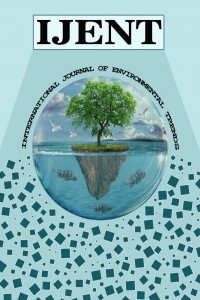
Uluslararası Çevresel Eğilimler Dergisi
Yazarlar: ["Mustafa KARABİLGİN", "Emine AĞAÇAYAK", "Berra Gül SAFRAN", "Merve AĞAÇAYAK", "Tevfik AĞAÇAYAK"]
Konular:-
Anahtar Kelimeler:Water pollution,Nanofibre,Oleophilic,Hydrophobic,Apricot kernel,Activated carbon
Özet: Heavy metals, waste oils, garbage, petroleum-derived polymers, animal and medical wastes cause pollution in water resources. The resulting pollution poses a danger to aquatic creatures and harms these creatures. In this study, obtaining wettable nanofibers for dewatering of oils mixed with water was investigated. It is aimed to increase the contact angle value by adding activated carbon produced from apricot kernels to the nanofibers produced from waste polystyrene. As a result, oil-water separation was carried out by increasing the hydrophobicity of the nanofiber and preserving its oil-holding property. In the experiments, 4 different concentrations of solutions were prepared using waste polystyrene and dimethylformamide (DMF)/(C3H7NO) and nanofibers were produced by electrospinning device. According to the SEM images, it was determined that the sample with the best fibre structure belonged to the 17% solution. On top of this, new nanofibers were produced by adding 5% and 10% by mass of activated carbon made from apricot kernels to the same solution. The contact angle values of the produced nanofibers were measured and it was observed that the hydrophobicity of the 10% activated carbon added nanofiber was the highest. In order to determine the water and oil absorption of the sample with the best structure and activated carbon added samples, it was tested by dropping 2 mL of water and 2 mL of oil on the experimental setup. As a result, it has been proven that this material, which has hydrophobic and oleophilic properties, can be used in oil/water separation processes, and the oil-derived waste polystyrene materials that cause water pollution are recycled.